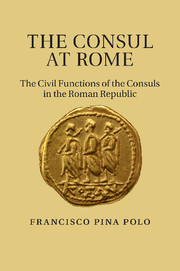Book contents
- Frontmatter
- Contents
- List of illustrations
- Acknowledgements
- Introduction
- PART I THE CONSULAR FUNCTIONS IN THE PRE-SULLAN AGE (367–81)
- 1 The consuls taking office
- 2 Consuls and civic religion
- 3 Consuls, the agents of diplomacy in the Roman state
- 4 Communication between the consuls and the people: edicts and contiones
- 5 Consuls as legislators
- 6 The jurisdiction of the consuls
- 7 Consuls as promoters of public works
- 8 Colonization and distribution of land
- 9 Appointment of a dictator
- 10 Consuls presiding over elections
- 11 The consular year in the pre-Sullan age
- PART II THE CONSULAR FUNCTIONS IN THE POST-SULLAN AGE (80–50)
- 15 Conclusion
- Bibliography
- Index of Subjects
- Index of Ancient Sources
- Index of Ancient Personal Names
6 - The jurisdiction of the consuls
Published online by Cambridge University Press: 25 October 2011
- Frontmatter
- Contents
- List of illustrations
- Acknowledgements
- Introduction
- PART I THE CONSULAR FUNCTIONS IN THE PRE-SULLAN AGE (367–81)
- 1 The consuls taking office
- 2 Consuls and civic religion
- 3 Consuls, the agents of diplomacy in the Roman state
- 4 Communication between the consuls and the people: edicts and contiones
- 5 Consuls as legislators
- 6 The jurisdiction of the consuls
- 7 Consuls as promoters of public works
- 8 Colonization and distribution of land
- 9 Appointment of a dictator
- 10 Consuls presiding over elections
- 11 The consular year in the pre-Sullan age
- PART II THE CONSULAR FUNCTIONS IN THE POST-SULLAN AGE (80–50)
- 15 Conclusion
- Bibliography
- Index of Subjects
- Index of Ancient Sources
- Index of Ancient Personal Names
Summary
Once the praetorship was created, jurisdiction was mainly the responsibility of praetors in Rome throughout the Republican period. In theory, the consuls could preside over formal proceedings on private law, such as adoption, manumission and emancipation. It is possible that they did actually perform such duties and it is reasonable that ancient sources did not see them as important enough to mention, unless something extraordinary happened in the process. However, the usual absence of the consuls from Rome allows us to presume that throughout the pre-Sullan period their intervention in such proceedings would usually be an exception. Nonetheless, it is unlikely, as De Martino claimed, that the consuls did not have civil jurisdiction in the Urbs. The consuls would have had no legal restrictions in this respect, given that such jurisdiction derived, after all, from their imperium, but their habitual absence from Rome would have made this responsibility, as a matter of custom, fall to the praetors.
However, in exceptional cases the senate entrusted consuls with the task of conducting extraordinary criminal investigations (quaestiones) and seeing to the punishments that followed the outcome of their inquiries. The assignment of consuls to perform criminal inquiries and to oversee their consequences had legal grounds in the ius coercitionis that resulted from the imperium with which they were invested.
- Type
- Chapter
- Information
- The Consul at RomeThe Civil Functions of the Consuls in the Roman Republic, pp. 122 - 134Publisher: Cambridge University PressPrint publication year: 2011



